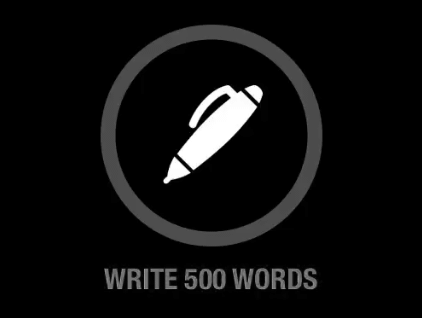Passion needs rigor
I always liked writing.
In the fifth grade, I wrote a dark, brooding story about a rat in a dungeon. My teacher liked it so much she read it in front of the class. At first I was embarrassed, but afterward, I felt validated.
Being affirmed, publicly, about my abilities made me want to write more.
By the time I entered high school, I'd written hundreds of poems and short stories. I was passionate about writing, and I felt like a good writer.
Then I joined, Dr. Nyberg's advanced English class.
On our first day in class, she gave us an assignment:
"Write a three-point essay."
The task seemed easy enough.
Up until this point, I'd been able to get by on natural talent. I hadn't had to try that hard to get good marks.
So, when I handed in my essay to Dr. Nyberg, I was expecting an A+.
But when I got it back, there were no affirmative platitudes. Instead, Nyberg had filled the margins of my paper with her marking pen. She pointed out all the places I could improve: succinct sentences, better structure, a stronger introduction.
And she wasn't just targeting me. I think the highest class mark on that first paper was a B. Some kids complained. Dr. Nyberg didn't hesitate; she just assigned more writing.
We wrote a new essay almost every single week. And each time we handed a paper in, there would be suggestions on how we could improve our writing.
Her class wasn't always fun. Sometimes, it felt grueling, and we'd whine:
"Nyberg, you're making us write another essay?! Can't we do something else?"
Writing essays over and over again seemed redundant. What was the point?
It didn't become clear until I graduated high school.
What I realized in college
I went to college for business.
On the first day of our marketing class, our prof gave us an assignment:
"Write a three-point essay."
I put my head down and intuitively started writing.
About halfway through, I looked around the class. Nobody else was writing. My classmates didn't know where to start. Even the idea of starting with an introduction, and ending with a conclusion, was foreign to them.
But, because of the rigorous practice I'd had in Dr. Nyberg's class, I could have written that paper in my sleep.
I got an A+.
Now, writing an essay comes readily to me. And that's not because of ingrained talent. It's a skill that was forged through Dr. Nyberg's coaching.
Passion isn't enough; we need the rigor
When I entered high school, I was passionate about writing, but I wasn't a good writer.
Dr. Nyberg took my natural talent and sharpened it into something useful.
Here are some ideas I'm trying to put into practice to bring "rigor" into my life.
Work in public
Whenever I can, I'm trying to share the process of what I'm working on.
For me, this means livestreaming, doing a podcast on my startup's journey, and sharing early drafts of my work. For my friend Adam Wathan, it means writing a work journal.
Consistently publishing updates about my work motivates me to keep practicing every week.
For example, I want to learn more programming. To practice, I'll go live on Periscope, Twitch, and YouTube and try to tackle a particular concept. People show up in the live chat and offer suggestions.
(It's kind of like pair programming with 10-20 people simultaneously)
Fostering a safe, but critical, peer group
I do a monthly call with Paul Jarvis and Jarrod Drysdale. We've been doing these calls since 2014. These guys aren't afraid to push back on my ideas or make suggestions for improving my work.
Likewise, the MegaMaker Slack has a #feedback channel, where anyone can ask for help or a critique.
We all need friends and colleagues who aren't afraid to challenge us; who can call us out on our bullshit.
Streaks
A lot of folks are talking about this app, Streaks. I was skeptical at first, but I've been using it consistently since January 1st.
Here's how it helps you develop a practice habit: every time you complete a daily task, you extend your streak.
So if you entered "Write 500 words a day," every day you completed that task you would give yourself a checkmark.
The more days you complete your tasks in a row, the more motivated you'll be to "not break the chain."
Mentors, coaches, teachers
To become a better writer, I needed Dr. Nyberg in my corner.
Going to a live, in-person, class or workshop is so beneficial; there's nowhere to hide!
When an expert feels responsible for your growth, they'll push you beyond your comfort zone.
Are we depending too much on self-actualization?
All of this has me thinking.
We makers are notoriously self-reliant:
- We teach ourselves using online courses, blog posts, and books.
- We pride ourselves in taking initiative, and self-directing our work.
Maybe being autonomous isn't enough. As individuals, we'll only push ourselves so far. We have blindspots. We can't always see where we need to grow.
We need more rigor.
Increasingly, I think the only way to get that rigor is from outside of ourselves.
Our passion is what brings us to the arena. But it's the coach who prepares us for battle.
Cheers,
Justin Jackson
@mijustin

